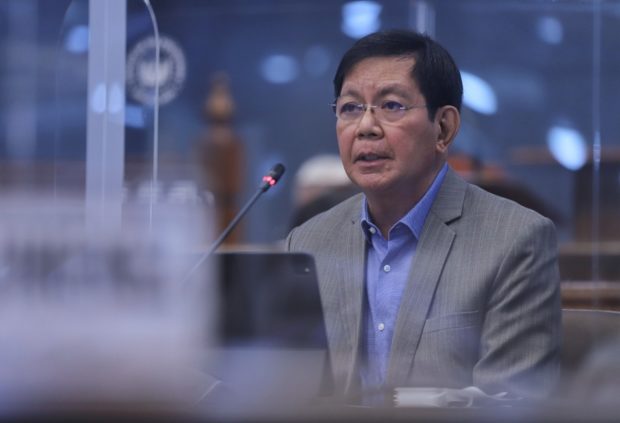MANILA, Philippines — Testimonies of whistleblowers and official records presented at Senate hearings proved that the state-run Philippine Health Insurance Corp. (PhilHealth) was under the thumb of a corruption “mafia” composed of its top officials, Sen. Panfilo Lacson said on Sunday.
It was PhilHealth’s resigned antifraud legal officer Thorrsson Montes Keith who first accused PhilHealth President and CEO Ricardo Morales and the rest of the executive committee of operating as a syndicate in funneling P15 billion into fraudulent transactions in 2019 alone.
Lacson, a former national police chief, said the Senate committee of the whole was able to secure sufficient evidence to warrant the indictment of Morales and at least three of his subordinates for malversation of public funds, violation of the antigraft law and other criminal offenses.
He said the panel, led by Senate President Vicente Sotto III, had already handed over documents to Justice Secretary Menardo Guevarra, who was tasked by President Rodrigo Duterte with leading a multiagency investigation into the various schemes that led to the health insurance firm racking up huge losses.
“I believe that during the weekly Senate hearings, we were able to gather enough evidence to prosecute and convict some officials responsible for malversation of public funds, among other violations of law,” Lacson told the Inquirer.
“Aside from the testimonies of their fellow PhilHealth officials, the documents that the (committee) had gathered clearly established culpabilities of those officials,” he said.
As to the existence of a mafia-like group in PhilHealth, the police official-turned-lawmaker said the actions of Morales and the rest of PhilHealth’s executive committee showed their complicity in the unabated corruption in the medical insurance agency.
“It may not sound good, but it turns out that they were really the mafia,” Lacson said in a radio interview. “Based on the documents that I have read, we can say that the mafia is (indeed) the executive committee (execom).”
The senator noted that orders came from the executive committee, which even prepared the master list of health facilities that received cash advances. He was referring to the distribution of the interim reimbursement mechanism (IRM), a P30-billion special financial package earmarked for hospitals treating COVID-19 patients.
As admitted by Morales and other PhilHealth officials at Senate proceedings, private dialysis centers and maternity clinics had also benefited from the cash windfall despite not having a single COVID-19 case.
Only for fortuitous eventsHealth Secretary Francisco Duque III, who also sits as PhilHealth board chair, conceded that the IRM was unlawfully disbursed since the resolution creating the special fund explicitly stated that it only covered “fortuitous events,” such as man-made and natural disasters.
Lacson said PhilHealth Regional Vice Presidents Michael Jibson Hernandez and Valerie Anne Hollero had testified that the list of hospitals that received IRM funds in Eastern and Western Visayas was just forwarded to them by their superiors.
‘Fourfold illegal’
Instead of vetting the program’s beneficiaries, the senator said the government-run insurance firm’s regional offices were left to prepare the agreements with the private and public health facilities, some of which got millions of pesos just a few days after filing requests for the IRM.
“I repeat, and I assume I’m not the only one who thinks this way, that it was the executive committee which made the maneuvers, was responsible for the overpricing (in the supply contracts) and even manipulated the PhilHealth funds,” he said.
Besides Morales, Lacson said PhilHealth Senior Vice President Renato Limsiaco Jr. should be charged for authorizing the questionable IRM distribution, which he described as “fourfold illegal.”
He said Limsiaco had admitted that his relatives were officials of a hospital in Catarman, Northern Samar, which received P9.6 million in advance payment from IRM.
Limsiaco was also responsible for supposedly falsifying the state-run health insurer’s financial statements as claimed by PhilHealth board member Alejandro Cabading, according to the senator.
“It’s very clear that it was Limsiaco, (as head) of the fund management sector, who really maneuvered everything,” Lacson said.
Senior Vice President Jovita Aragona and Senior Manager Calixto Gabuya should be held liable for the botched P2.1-billion information technology (IT) project, which the health insurer had canceled.
‘Continuously lying’
In the Aug. 18 hearing, Lacson moved to cite Aragona and Gabuya for “continuously lying” regarding the purchase of an IT equipment that cost nearly five times its commercial price of P62,000.
He said Sotto, who presided over the three Senate hearings, would sponsor the committee report, which the Senate leader was expected to present to the plenary within the week.
Guevarra and his team from the Department of Justice (DOJ) had committed to help the chamber in coming out with measures to clip the executive committee’s power in running PhilHealth operations.
“It is now up to the DOJ task force to follow through and gather more evidence to indict the others considering their powerhouse composition,” Lacson said.
